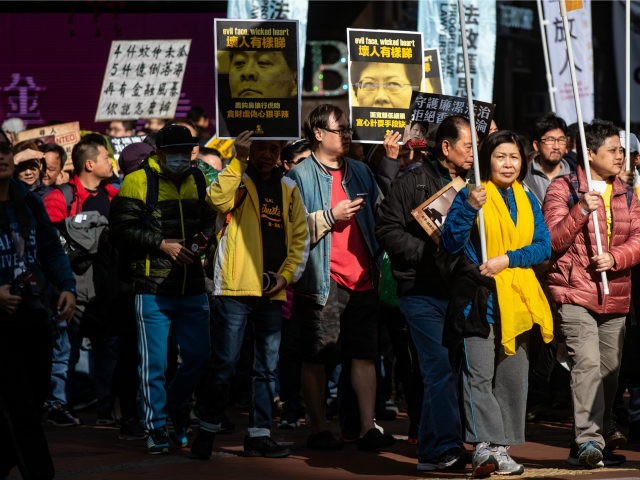New Year’s Day brought thousands of demonstrators to the streets of Hong Kong to denounce China’s oppressive policies and to demand respect for human rights and the rule of law.
“Looking back at the year that passed, it was a very bad year,” said protest organizer Jimmy Sham. “The rule of law in Hong Kong is falling backward.”
Estimates for the size of the demonstration ranged from 3,200 to 5,500 people. Even the higher estimate would be only half the size of last year’s annual demonstration.
Reuters noted that number included about a hundred independence activists who called for Hong Kong to declare independence from China, which regards such talk as sedition and demands increasingly harsh punishment for “separatists.” Some of them waved Tibetan and Taiwanese flags to show their solidarity for other targets of Chinese repression.
“There will be continuous suppression on the Hong Kong independence movement, but the movement will grow stronger and stronger,” independence activist Baggio Leung predicted.
Baggio Leung was one of the young independence-minded legislators who was banned from his elected office in 2016 for inserting gestures of defiance toward China in their oath of office. Democracy activists saw China’s intervention to keep Leung out of his seat as a fatal blow to Hong Kong’s judicial independence.
Leung, now a spokesman for a Hong Kong independence group, warned in October that China is taking the island “backward a hundred years” to the xenophobia of the Boxer Rebellion through actions such as evicting Financial Times editor Victor Mallet.
“Beijing will never distribute power. It will not let you enjoy a real democratic system. Without sovereignty, everything is just empty talk, including a democratic system,” Leung said.
On Tuesday, Leung and some other independence activists reported acts of harassment, including the theft of demonstration supplies from a storage room and a menacing group of masked men stalking student leaders. The activists blamed legal and extralegal harassment for the lower turnout of this year’s demonstration, along with a sense of fatalism about Chinese dominance overcoming Hong Kongers.
Demonstrators on Tuesday lamented Mallet’s expulsion, the banning of the pro-independence Hong Kong National Party, draconian new national security legislation, and recent scuttling of a corruption investigation into a prominent pro-China politician as signs of growing political repression on the island. They were also apprehensive about possible jail sentences for leaders from the huge protests in 2014.
“We have experienced a lot in 2018 – society, politics and people’s livelihood have all regressed. I can’t see hope in 2019,” said protester Kwan Chun-pong.
“I’m afraid the pressure will continue. We’re going to face a few difficult years, but we must stand firm,” predicted retired professor and human rights activist Joseph Cheng, who noted that at least Hongkongers are still allowed to protest, unlike the people of mainland China.
Those protest rights were sorely tested by an edict from Hong Kong officials that pro-independence banners could not be displayed outside government offices, a demand that organizers from the Civil Human Rights Front described as “unprecedented” and refused to obey.
Organizer Jimmy Sham said the Civil Human Rights Front does not support independence but respects the right of individuals to advocate the position. He denounced the ban on independence banners as a human rights violation with little justification under Hong Kong law.
“I cannot see why our freedoms are limited once we step in the gateway of the forecourt. Are the streets we march along not under the reign of the government?” he asked.
According to the South China Morning Post, the small contingent of independence activists broke away from the main protest march before it reached the government buildings where independence banners were banned. A few stalwarts did make a point of pushing past security guards and marching through the government square with a placard reading, “Only with two countries will there be two systems.”
The SCMP reported small groups of pro-Beijing marchers also took to the streets and “were involved in minor confrontations with their rivals in the larger rally.”

COMMENTS
Please let us know if you're having issues with commenting.